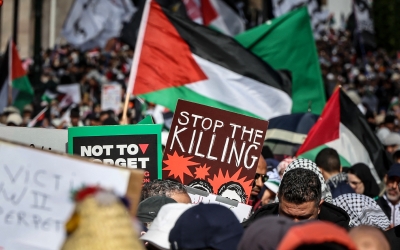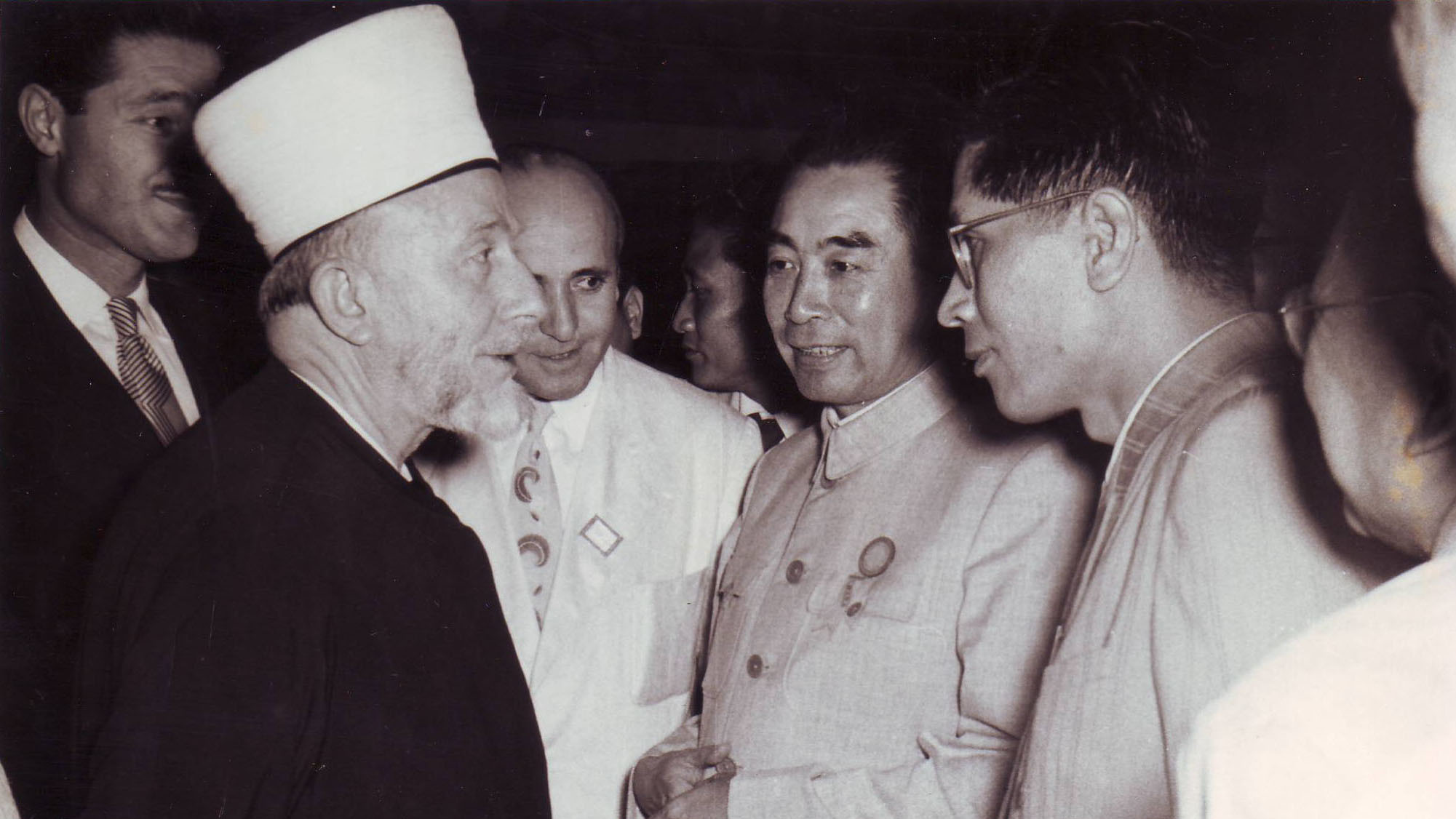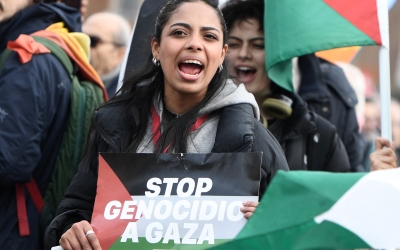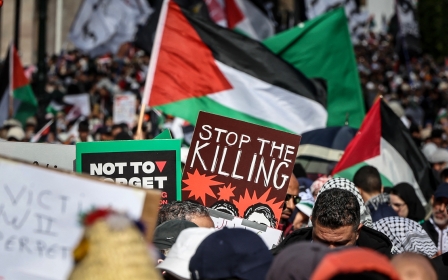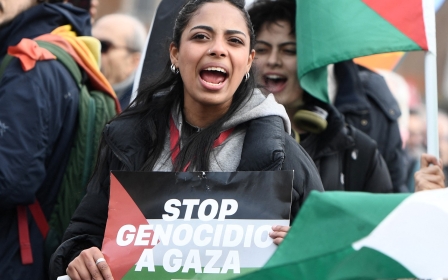Palestine at Bandung: How the historic Asian-African conference challenged imperialism
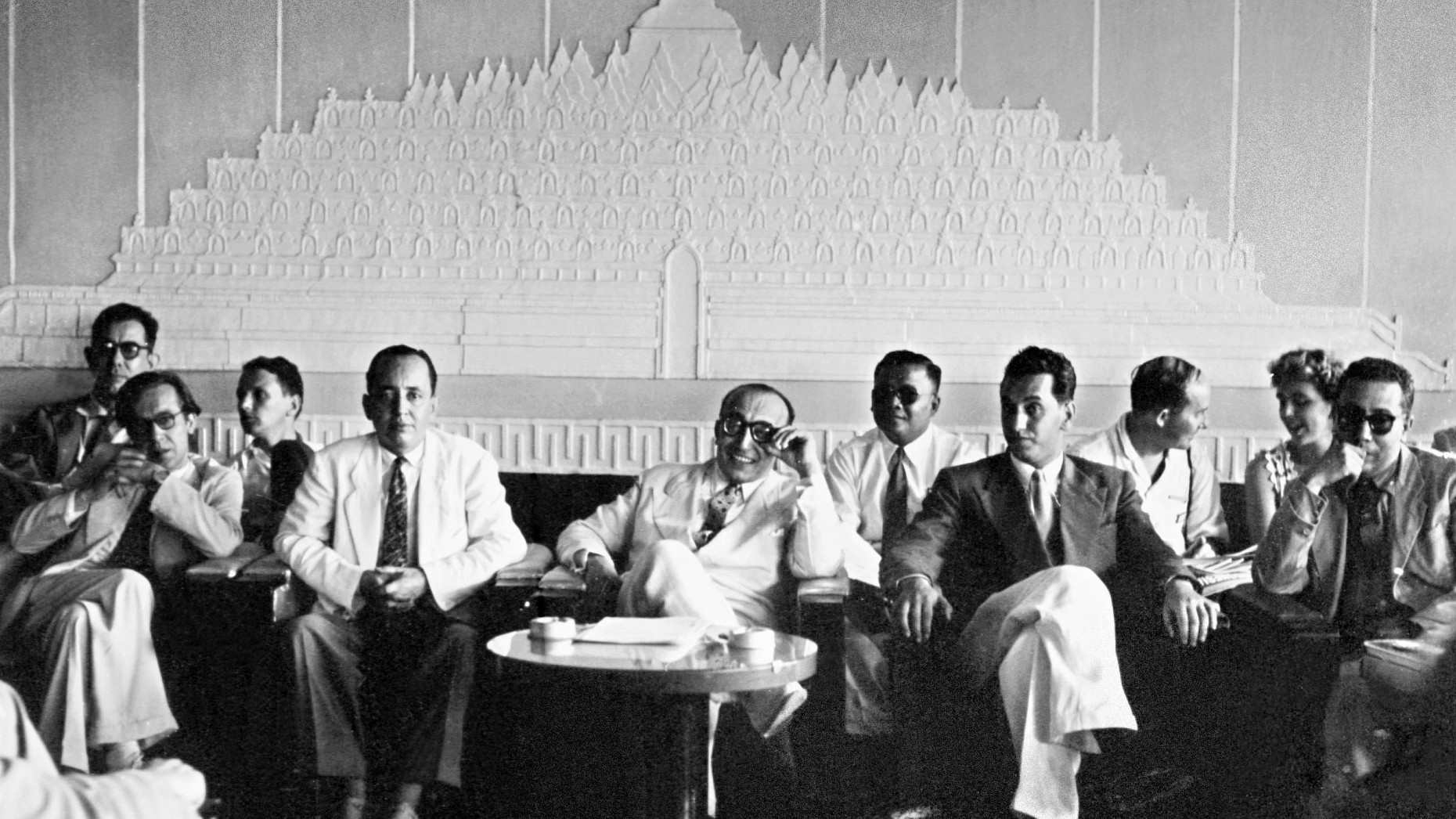
The Palestinian people's fight for independence and self-determination has not ceased since World War One.
In 1919, the Palestinians appealed to the imperialist powers meeting at the Paris Conference, demanding independence. But like those of many other colonised peoples who appealed to the conferees, their demands were ignored.
Imperial support for the Zionist settler-colonial project went into high gear when it was formally supported by the League of Nations, which included the Balfour Declaration in its official Mandate over Palestine that was handed over to the British.
New MEE newsletter: Jerusalem Dispatch
Sign up to get the latest insights and analysis on Israel-Palestine, alongside Turkey Unpacked and other MEE newsletters
In addition to the Arab world, movements were sparked in India, Indonesia, and Vietnam, to name a few. In 1945, the Pan-African movement was resuscitated at its fifth congress held in Manchester, where it also demanded self-determination and independence for African peoples under colonial rule, including the North African colonies and protectorates of France.
A decade later, the leaders of formerly colonised nations of Asia and Africa came together at the Bandung Conference in April 1955.
At Bandung, which marks its 69th anniversary this month, the leaders declared the centrality of self-determination to the post-war order when they affirmed it as the "pre-requisite of the full enjoyment of all fundamental human rights".
Affirming self-determination
The Bandung Conference was convened by India, Pakistan, Burma, Indonesia, and Ceylon. Of the 29 countries participating, six were African. They included: Egypt, Libya, Sudan (which was not yet independent), Ethiopia, the Gold Coast (still a Crown colony), and the settler-colony of Liberia.
What transpired at Bandung was a reversal of the hegemony of the imperial powers, especially the US, which opposed calls for self-determination
Among the observers who attended were representatives from the national movements in the settler-colonies of Morocco, Tunisia, and Algeria, as well as three African National Congress and South African Indian Congress observers from South Africa. The US Black Congressman Adam Clayton Powell also came to "defend the position of the United States in relation to the Negro problem".
Haj Amin el-Husseini, the Palestinian former grand mufti of Jerusalem, joined as part of the Yemen delegation, as did representatives of West Irian, who sought liberation from the Dutch.
What transpired at Bandung was a reversal of the hegemony of the imperial powers, especially the US, which opposed calls for self-determination.
Asian and African countries had been fighting for the inclusion of self-determination at the United Nations since the end of the Second World War. Since 1950, debates in the Third Committee of the UN General Assembly had raged, with colonising countries insisting on a colonial exemption clause in the future resolution.
Follow Middle East Eye's live coverage of the Israel-Palestine war
In 1952, the United States voted against a UN General Assembly resolution declaring self-determination as a human right and "bitterly resisted requirements that colonial powers report on the progress of non-self-governing territories toward self-government".
The imperial countries were vehemently resisted by Asian and African delegates. Prominent among them were Arab delegates from Syria, Iraq and Saudi Arabia, who played a crucial role in defeating the colonial clause and in pushing for self-determination as a human right.
A few months after Bandung, in November 1955, the Third Committee agreed on the formulation of the right of self-determination, which was to be later adopted in the 1960 resolution and 1966 UN Covenants.
The vote came after much agitation and opposition from the US government and American corporations regarding any whiff of economic self-determination at the UN. They insisted that the right may only encompass political self-determination, especially in the wake of Guatemalan President Jacobo Arbenz Guzman's land reform measures, which referenced a 1952 UN General Assembly resolution supporting nationalisation and threatened US businesses.
The US would oust Arbenz from power by arranging a military coup against him in 1954.
Chile, like the rest of Latin America, which was economically dominated by the US, in turn sought to amend the draft human rights covenants during the same year to state that the "right of people to self-determination included the economic right to control all of their natural resources and not to be deprived of their use or their means of existence by the actions of any outside power."
American critics at the UN were so appalled by the moves to establish economic independence that they called Soviet and Third World attempts to institutionalise economic self-determination for Third World independent states as a form of "hate language", or what is called "hate speech" today.
To the horror of the white imperialist world, which feared the conference and condemned it as communist, the Bandung Conference denounced racialism in South Africa and colonialism in Morocco, Algeria, and Tunisia. It further supported the rights of the Palestinian people and Indonesia's claims to Western Irian (or Dutch New Guinea).
Limits of solidarity
The Jewish settler-colony of Israel, like South Africa, was not invited to attend despite attempts by Indian Prime Minister Jawaharlal Nehru and Burmese Prime Minister U Nu to invite it, which the Indonesians vehemently opposed.
No white settler-colony in Africa ever got away with so little condemnation as Israel did in those years
The Indians also supported the invitation of the settler-colonies of Australia and New Zealand - also rejected by Indonesia - though neither of the two Oceanian settler-colonies was interested in attending.
Indonesia's President Sukarno announced to the delegates and the rest of the world: "This is the first international conference of coloured peoples in the history of mankind." He saw the Asian-African Conference as in the tradition of the League Against Imperialism that had met in Brussels three decades earlier, which he recognised as a precursor to making the Bandung Conference possible.
Sukarno spoke of colonialism in "modern dress in the form of economic control, intellectual control, actual physical control by a small but alien community within a nation".
Although the USSR, substantially located in Asia, was not invited, it sent messages and greetings in support of the conference.
China's Zhou Enlai offered cooperation, mutual recognition, and tolerance. The Chinese delegation included a Muslim Chinese leader.
At the same time, the CIA had dispatched Soviet Muslim former collaborators with the Nazis (who, after World War Two, were recruited by the CIA) to the Bandung Conference to propagandise against the Soviet Union's alleged mistreatment of Soviet Muslims to undermine Soviet standing among the non-aligned nations. One Eisenhower administration official identified the CIA operation at Bandung approvingly as a "Machiavellian" move.
Unlike the massive solidarity shown to the Palestinians by the few independent Asian countries at the UN in 1947, by 1955, western and Israeli propaganda that claimed that the Jewish state was a just reparation by Europe for the Holocaust succeeded in infiltrating a number of independent Asian and African countries.
The success of this propaganda was such these countries would now support a semblance of rights for both the indigenous Palestinians and their Jewish colonisers - equating the colonisers and the colonised.
No white settler-colony in Africa ever got away with so little condemnation as Israel did in those years.
'Grievances against Israel'
The Paris-based African-American writer Richard Wright attended the conference and wrote a book about his experience. Impressed that representatives of more than one billion "coloured" people from countries that were "religious" would attend the conference, Wright, who grew up Methodist and Seventh-day Adventist, decided to participate as well.
Not a fan of Islam, Wright, a former member of the US Communist Party (he left the party during World War Two in opposition to its call on African Americans to fight in a white man's war and became an anti-Communist working with the CIA's "Congress for Cultural Freedom"), identified an Indonesian Muslim native-informant whom he interviewed for his research as having a "totalitarian outlook" that "was born of his religious convictions."
On the plane to Bandung, Wright heard the "excited voices" of North African Arabs "discussing Palestine". "Whether they let us raise the question of Jewish aggression or not [at the conference], we are going to raise it...Their crimes will not be covered up," he quotes them as saying.
Wright also described hearing "a dark-faced man with a thin moustache" shout that the Israelis were "the greatest racists on earth", which he vowed to prove. The man passed around photographs "of Arab refugees driven by Jews out of their homes". Wright asked him if Palestine is "coming up for discussion at Bandung", to which the man assured him that he and other delegates "are going to raise it…the world must know what has been done! It's our duty to make the world know."
Wright peered over the photos "showing long lines of men, women, and children marching barefooted and half-naked over desert sands, depicting babies sleeping without shelter, revealing human beings living like animals." But he could not muster any sympathy for the Palestinians nor for the Arab delegates he encountered on the plane.
When he looked up from the photographs into the face of the Arab man, who only spoke to him about the Palestinian tragedy and not about his religion, Wright, in the tradition of Protestant Zionism and European views of Muslims and Jews, found him to be "hot, fanatic. This man was religious. It was strange how, the moment I left the dry, impersonal, and abstract world of the West, I encountered at once: religion…And it was passionate, the unyielding religion, feeding on itself, sufficient unto itself. And the Jews had been spurred by religious dreams to build a state in Palestine…Irrationalism meeting irrationalism…"
Wright added:
"Though the conversation about the alleged aggression of the Jews in Palestine raged up and down the aisles of the plane, I could hear but little of it; all I could make out was that the Jews could come under sharp and bitter attack at Bandung, and that they had enemies who had a case and knew how to present that case at the bar of world opinion…I recalled that six million Jews had been gassed, hounded, slaughtered, and burned by German Hitlerites, and I knew that people, hapless and haunted, had yet more suffering and trials to bear in this world."
This is not to say that Wright was not aware and critical of European racism against Muslims and Islam, as indicated in subsequent conversations he had in Indonesia. At the conference, he observed that "the entire Arab world, headed by Egypt's Nasser, would be seeking to air its direct grievance against Israel and its indirect case against France".
Still, Wright did not seem enamoured of Zionist nationalism either. According to his biographer, when friends suggested that he move to Israel in 1954, Wright "felt no affinity with the idea of a Jewish homeland" and even stated that "it would be like my claiming Africa for American Negros". His biographer paraphrased his attitude: "There was the problem of the Arabs, toward whom the Jews in Israel were heartless."
Mixed legacy
It was on account of such widespread views in the West and in some corridors of the Third World that Egypt's President Gamal Abdul-Nasser declared in his conference speech:
"Under the eyes of the United Nations and with her help and sanction, the people of Palestine were uprooted from their fatherland, to be replaced by a completely imported populace. Never before in history has there been such a brutal and immoral violation of human principles. Is there any guarantee for the small nations that the big powers who took part in this tragedy would not allow themselves to repeat it again, against another innocent and helpless people?"
The final communique the conference issued included a condemnation of European settler colonialism and the denial of self-determination and support for the "rights of the people of Algeria, Morocco and Tunisia to self-determination and independence".
As for the Palestinian people, the communique declared "its support of the Arab people of Palestine and called for the implementation of the United Nations Resolutions on Palestine and the achievement of the peaceful settlement of the Palestine question".
This was hardly a radical call but more in line with the delegates' reigning language. For example, the conference also "extended its warm sympathy and support for the courageous stand taken by the victims of racial discrimination, especially by the peoples of African, Indian, and Pakistani origin in South Africa."
Indeed, there was no mention of the rest of the settler-colonies in Africa, not the Portuguese (Angola and Mozambique), nor the British (Kenya, Rhodesia, Sierra Leone, East Africa), not even Namibia, let alone any mention of what was happening in Liberia, a participant at the conference.
Still, Bandung was momentous in founding alliances among Asian and African states in opposition to imperial policies, which the US and Western Europe continued to pursue.
While imperial threats, pressure, and intrigue undermined such alliances over the following decades, the fall of the Soviets and the Eastern Bloc dealt anti-imperialism the coup de grace.
Still, in the last two decades, we have begun to see the slow but sure rise of anti-imperial voting blocs at the UN, the latest manifestation of which is the vehement opposition to US and European support for Israel's ongoing genocide.
It seems that as hard as the US and Europeans try, no threats or pressure have been able to stop this wave of anti-colonial solidarity with the Palestinian people.
Nonetheless, if the unfolding genocide against the Palestinian people is any indication, Nasser's hope that one day there should be a "guarantee for the small nations that the big powers who took part in [the Palestine] tragedy would not allow themselves to repeat it again", was never fulfilled.
The views expressed in this article belong to the author and do not necessarily reflect the editorial policy of Middle East Eye.
Middle East Eye delivers independent and unrivalled coverage and analysis of the Middle East, North Africa and beyond. To learn more about republishing this content and the associated fees, please fill out this form. More about MEE can be found here.



